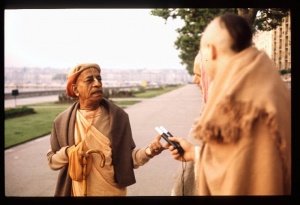SB 1.18.29

A.C. Bhaktivedanta Swami Prabhupada
TEXT 29
- abhūta-pūrvaḥ sahasā
- kṣut-tṛḍbhyām arditātmanaḥ
- brāhmaṇaṁ praty abhūd brahman
- matsaro manyur eva ca
SYNONYMS
abhūta-pūrvaḥ — unprecedented; sahasā — circumstantially; kṣut — hunger; tṛḍbhyām — as well as by thirst; ardita — being distressed; ātmanaḥ — of his self; brāhmaṇam — unto a brāhmaṇa; prati — against; abhūt — became; brahman — O brāhmaṇas; matsaraḥ — envious; manyuḥ — angry; eva — thus; ca — and.
TRANSLATION
O brāhmaṇas, the King's anger and envy, directed toward the brāhmaṇa sage, were unprecedented, being that circumstances had made him hungry and thirsty.
PURPORT
For a king like Mahārāja Parīkṣit to become angry and envious, especially at a sage and brāhmaṇa, was undoubtedly unprecedented. The King knew well that brāhmaṇas, sages, children, women and old men are always beyond the jurisdiction of punishment. Similarly, the king, even though he commits a great mistake, is never to be considered a wrongdoer. But in this case, Mahārāja Parīkṣit became angry and envious at the sage due to his thirst and hunger, by the will of the Lord. The King was right to punish his subject for coldly receiving him or neglecting him, but because the culprit was a sage and a brāhmaṇa, it was unprecedented. As the Lord is never envious of anyone, so also the Lord's devotee is never envious of anyone. The only justification for Mahārāja Parīkṣit's behavior is that it was ordained by the Lord.